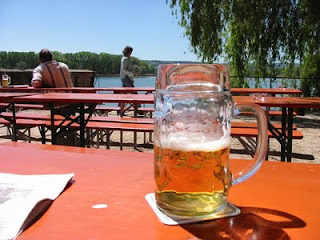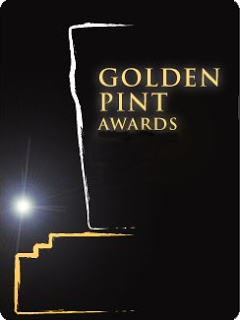Lager, ale, who cares?
 Time and again I read some article along the lines of "There are two basic families of beer, ale and lager ..." followed by a simplified explanation of yeast behaviour at different temperatures.
Time and again I read some article along the lines of "There are two basic families of beer, ale and lager ..." followed by a simplified explanation of yeast behaviour at different temperatures.I shall ignore for the moment the many beers which don't even fit into this categorisation ... and the related argument about whether it makes any sense whatsoever to call e.g. Weißbier "an ale", just because it is made with top-fermenting yeast (answer: no it doesn't).
This seems to be one of the first things people learn when getting into beer, even though it's actually quite an esoteric subject to confront people with.
Is this distinction so important? It seems to me to be only one of a multiplicity of factors affecting the final beer.
There are all manner of achses that you could choose to use to divide up the world of beer, along essentially arbitrary lines.
You do get people occasionally saying they think the main difference is between pale beers and dark beers, but they tend to be considered naive. But are they so wrong? Doesn't the kind of malt used contribute as much to the character of the beer as the kind of yeast and the type of conditioning?
Why do we have this obsession with lager versus ale? It's only one of many differences between different kinds of beer.
You never hear anyone say:
"There are two basic kinds of beer: bitter ones and sweet ones"
"There are two basic kinds of beer: those made with hard water and those made with soft water"
"There are two basic kinds of beer: those with high attenuation and those with low"
"There are two basic kinds of beer: the ones made with funky yeast and the ones with more neutral yeast"
"There are two basic kinds of beer: those made mostly from barley malt and those made mostly from wheat"
I am going to try an experiment. I will no longer pay attention to whether something is top- or bottom-fermented. I'm far more interested in whether it tastes of toffee, lemon, banana, mint, chocolate, coffee, mouldy brie, cowpats, vinegar, smoke, grass or wine.


You're dead right. Often, in Germany, I have no idea whether a particular beer is top or bottom fermented. I've had bottom-fermented beers that taste as rich and fruity as any top-fermented ale, and there are top fermented beers with crisp clean tastes that most would associate with bottom fermenting beers. Then when you get into top-fermented lagerbier, it's all too much hassle to worry about it. Just drink and enjoy (or not, as either can be crap or good beer :))
ReplyDeleteI agree totally. A few months back I started to educate myself about beer and very soon decided that the ale/lager distinction and the whole concept of judging a beer by how 'true to type' it is was irrelevant to me. I am more interested in how enjoyable the beer is for the particular occasion and/or accompanying food.
ReplyDeleteIf you are interested in my progress or (more likely) some great beers that are now being produced in Victoria, Australia take a look at www.vicbrews.wordpress.com. Lots of us in Australia hate Fosters too!
Cheers
Couldn't agree more!! I'll pass on the cowpats but what's really important is if it tastes nice.
ReplyDeleteAs Barry says - just drink and enjoy
I agree, too.
ReplyDeleteI always say: The most, if not the only, important thing is what's in the glass. All the rest is, at best, interesting.
I don't see how the two positions are mutually incompatible. Yes of course be concerned primarily by whether it is nice beer or not-nice beer, and which features determine the niceness: it would be daft not to.
ReplyDeleteBut this is totally separate from the fermentation type, which is a useful rule of thumb when it comes to describing beer.
What prompted this post? Were you once a zealous top-fermented purist or something?
The only place I've seen a "lager vs. ale" attitude is in some CAMRA literature which explained why ale=good; lager=bad, and I can't even find that online any more. Oh, and at the Heineken Visitors' Centre where the hocking of lager necessarily involves the denigration of ale. And later on you can see a Heineken employee making ale.
So who are these people who judge a beer by its fermentation altitude?
On the contrary, I was a lager enthusiast for about two years before I discovered real ale (I still remember how exciting Theakston's XB tasted compared to the pasteurised McEwan's I'd encountered before).
ReplyDeleteIt's not really about a "lager vs. ale" attitude (there will be a forthcoming post devoted exclusively to ridiculing that). It's about the idea that lager and ale are two separate worlds and every beer in the world belongs to one of the two categories. If you don't believe it exists, google "difference between ale and lager". It seems as bizarre to me as the once common view that Englishmen and Frenchmen were different animals.
Or the view that the sun "rises" and "sets", even though we now know it does no such thing and it would be stupid to use those terms? I think you're making too much of a verbal shortcut/broad generalisation.
ReplyDeleteYup, I'm with you on this one. Beer is beer, some are made differently to others, some ferment spontaneously, some go up and some go down, some are good and some are not. It's the taste that matters, I think. Nice post.
ReplyDeleteBeer Nut, a broad generalisation is fine and I don't object to that. What I object to is the idea that this is the first and most important thing anyone has to learn about beer (in some cases, all they have to learn).
ReplyDeleteI can see why it's the first thing one learns, precisely because it's a super-broad generalisation -- a useful first point on the hermeneutical circle, if we want to get all epistemological and shit -- but I'm not seeing any claims that it's the most important thing. Are you?
ReplyDeletePlenty of the kind of thing I'm talking about on this thread at BeerTwat: http://beeradvocate.com/forum/read/2403436
ReplyDeleteTry arguing that Bavarian wheat beer shouldn't be lumped together as "ale" with Belgian dubbel and see the reaction you get.
You know, I don't think I will. But I take your point. These people haven't been able to let go of that one piece of information the learned ages ago, now that everything else they've learned has moved them on beyond the need for it.
ReplyDeleteI'm wondering what's to be gained by lumping Bavarian wheat beer with Belgian dubbel, but not enough to actually go find out.
I poked some homebrew twats with a stick to see what would happen: http://beeradvocate.com/forum/read/2432653
ReplyDelete